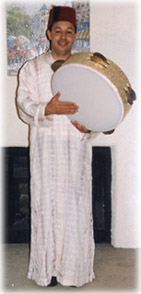
Noisy Toys interviews:
Aziz Alami, Director, “Voices of the Kasbah”
 Aziz Alami |
|
NT: Tell us how the music of Morocco is connected to the county’s folklore and history.
Alami: The music of Morocco is a combination of several folklores. Morocco is divided into many parts and the people speak different dialects, including four kinds of Berbers. The Berbers are the first inhabitants of Morocco. They play a steel drum made mostly of car parts, like brake drums. They also play tabla, commonly known as Moroccan bongos, and a single stringed instrument like a violin called rabab.
Another popular style is Gnawa music which comes from Ghana mostly and uses karakeb. They are large metal castanets that were believed to help cure people, like exorcists. It’s similar to Sofi music from Turkey, which puts people in a trance. Gnawa music has religious roots and came from African slaves or soldiers led by Moulay Ismael. It was used for prayer and celebration. They also play hjajhou, the first bass guitar. It’s made out of wood covered with cow or camel skin and strings made out of animal intestines. It has a very nice bass sound.
The third kind of Moroccan music is called Chaabi. It’s more modern
and comes from the countryside for celebrations. It’s similar to Middle Eastern music and uses instruments like violin, keyboards and drums.
“Voices of the Kasbah” plays a variety of these styles, especially the popular music and Gnawa music.
NT: What are your early recollections of the Moroccan music?
Alami: My Dad used to write and sing his own songs, but he never wanted to perform in front of an audience. I enjoyed his singing and that’s how I got attached to the music. But he wouldn’t let me have my own instrument because he didn’t want me to go on the road. He was afraid I would pick up bad habits like drinking or smoking cigarettes. He wanted me to go to school and study instead. My Dad passed away when I was 9 years old and that’s when I started playing drums. I bought my first Moroccan bongos during the holiday of Ashora. It’s something like Christmas here.
I started playing in bands when I was 14. In my first group we sang our songs and played Moroccan bongos, 2 bendirs (frame drums) and a guitar. At first we played only for school celebrations and sports events. Many bands also play music in the streets.
NT: Do Moroccan groups play in clubs like we do here or in the streets?
Alami: Our band never played in the street because we were going to school and not performing for a living. The only time we played in the street
was when we played at the celebration for the king on a big outdoor stage. We also played in clubs, especially during Ramadam. Later we added a doumbec, a drum set, tambourine, violin and keyboard. There are poly-rhythms with Moroccan music and it works better with more players. You have to listen very carefully to the player next to you.
NT: When did you come to the U.S.?
Alami: I came to the U.S. in 1997 as a student and I stopped playing for 4 years. Then I met a Jewish Moroccan guy and we started playing the music.
Then I looked for Moroccan musicians who had not moved to Israel because the music style is a little different.
NT: Why is it important to you to keep the traditional Moroccan music alive?
Alami: I believe playing the roots music is important. The old music is like poetry, very emotional. Now days it’s more commercial. I like to stay attached to the roots music because it’s more like real, true stories. Those stories hold true even today.
NT: Explain the family drumming tradition that still exists in some parts of Morocco.
Alami: This tradition is from the Atlas Mountains. After the harvest at the end of the season there were many celebrations and the main instrument was the bendir. The bendirs are made very well over there because the drum-making secrets were passed down from father to son. It was a source of pride in the family how well the sons made and played their own bendir.
Some of the instruments described in this interview are available at Noisy Toys drums & percussion.
<- index of interviews

[ home ]